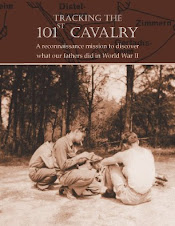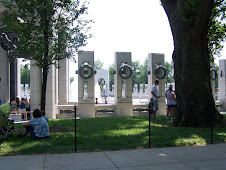 I found Murray Dressler at Kaufering.com, a website dedicated to the 11 concentration camps near the towns of Kaufering and Landsberg in Bavaria. The camps were small, but, even so, more than 14,000 people, mostly Jews, died there. Murray’s father survived. More than anything, I wanted to talk to him, because men in my father’s platoon were some of the first to discover the Kaufering camps. Murray helped make that happen.
I found Murray Dressler at Kaufering.com, a website dedicated to the 11 concentration camps near the towns of Kaufering and Landsberg in Bavaria. The camps were small, but, even so, more than 14,000 people, mostly Jews, died there. Murray’s father survived. More than anything, I wanted to talk to him, because men in my father’s platoon were some of the first to discover the Kaufering camps. Murray helped make that happen.Henry Dressler’s voice is deep and strong and carries a hint of his native Poland. It is a serious voice. As he speaks, there is a sense that he has told this story many times. He speaks without emotion; it is recitation.
Interviewing someone who survived the Holocaust is difficult, I discovered. “What was it like? How did you feel?” What insipid questions. What can you ask that will help you understand a horror that is beyond words? How can we expect someone to describe it in a way that helps us even begin to comprehend? I spoke with Mr. Dressler on the phone, but I needed to see his face as we talked; I needed to look into his eyes. Maybe comprehension was there.
"I was born in Lodz, Poland, in 1925," Henry Dressler begins.
The Germans walked into my city in 1939 within months of my Bar Mitzvah. They marched in on a Friday, right after the candle-lighting. From the day they first arrived, we couldn’t walk on the main streets. We had to go to the back streets. We couldn’t go to school.
We were moved into a ghetto in 1940. Things were very bad there. There was no food. People were starving, dying in the streets. The ghetto had its own government – police, fire, distribution of food, even its own currency.
Mordechai Chaim Rumkowski was chosen to run the ghetto. He thought he was a king. He’d go to the cemetery and talk to his wife: “I’m the king of the ghetto,” he’d tell her. He had been the head of an orphanage before the war. He had done a lot of good, but after the war started he came under the influence of the Germans. In the end, he went to Auschwitz like everyone else.
In the ghetto we had no wood, no heat. In the winter the walls were covered with snow. Beginning in August 1944, every second day people would be called away. Trucks took them to Auschwitz.
One of my two sisters died in the ghetto, and my father died of starvation. In 1944, my brother, my other sister, my mother, and I were sent to Auschwitz. It took three days to get there. During that time, we had no food and no sanitation.
At Auschwitz, my brother and I were separated from my sister and mother. They went straight to the ovens. We had heard that if you had the same last name, you would be separated, so I used my mother’s maiden name. That way my brother and I were able to stay together.
My brother and I didn’t stay long at Auschwitz. Within days we were transported to Landsberg to work – Landsberg was where Hitler wrote Mein Kampf.
We were working every day in Landsberg. We worked on the railroad, fixing the rails. Some days they gave us just worthless work to keep us tired and busy.
What food there was there was bad; everyone got sick. Later on we didn’t work – it just became a death camp. That was about two months before liberation. My brother died in April, the month we were liberated, beaten by the capos and the Germans.
The German citizens, the people who lived in Landsberg and Kaufering, they saw us each day. They watched us go to work and called us bad names. We would see them standing in front of their houses laughing. They knew. They saw it. And they just stood laughing and making jokes. They knew exactly who we were – "Juden," they called us. Everyone knew. After the war, no one knew anything.
It wasn’t easy to deal with it all. But we were so hungry, we only thought of food. We were sick and isolated. We had a little watery soup. Everyone ate it and everyone got sick. The Germans were afraid of our sickness, so they would stay away from us. The capos did everything.
We didn’t know the Americans were coming until the day they came. One day in late April the Germans gave us a piece of bread and lined us up for our “last march.” Then a high officer came and said it was too late, that we couldn’t leave. That night we heard shooting and bombardments, and the next day the Germans were gone.
When we woke up on the morning of April 27, we went out like we always did to be counted, and the camp was empty and the gates were open. We were free. The Germans had left their tanks, trucks, everything. We started to grab bread, but it made us sick.
Some of the Germans who had been guarding the camp changed out of their uniforms. They just disappeared, they ran away so fast. But most of them were caught.
In camp #1 they didn’t have time to run. A Russian Christian in that camp took a shovel and opened the head of one of the Germans. The Jews didn’t do that.
The Americans helped us by transporting the very sick to hospitals, by giving us food. Still, after the war many more people died.
We were put in a displaced persons camp for four years after the war. We had classes in the occupational trades. I worked in a metal workshop. Some people worked in the kitchen. Everyone did something.
I met my wife in 1946 in the displaced persons camp. The Nazis had her working in an ammunition factory during the war. She lost everyone. Like me, she was from Lodz. She had her mother with her. Her sister, brother, and father had left for Warsaw, thinking it would be better. Once they got there, they planned to send for the rest of the family. Of course, they couldn’t.
All we thought about were our families. I was alone. I knew what happened to my mother and one sister, but not my other sister. Not what happened to all my aunts, uncles, cousins. I had one friend from our city, and he and I went back to Poland in 1945 to look for our families. The Poles saw us and said, “Look at how many Jews are left.”
I couldn’t find any of my family, so I returned to Germany. We didn’t want to go back to Poland. No one accepted us. They didn’t accept us before the war or after.
Everyone was gone. It was very hard, very painful. I am the only surviving member of my family, except for two uncles who left Poland in 1916; one went to America and one to Switzerland.
I was in Germany until 1949, then I went to Israel until 1961. I finally found my uncle in America, and he sent for me. My wife and I have two sons and four grandchildren. A small family. I don’t talk much about the past. One son reads a lot, and he knows what it was. I don’t like to talk about it; it makes them upset. The thoughts are with myself. Not a day goes by that I don’t think about my family that is lost.
Henry Dressler lets me know the interview is over with an expression he had used many times when I expressed sorrow at what he went through. This time it had a note of finality: “It was what it was,” he says. “It was what it was.”





No comments:
Post a Comment